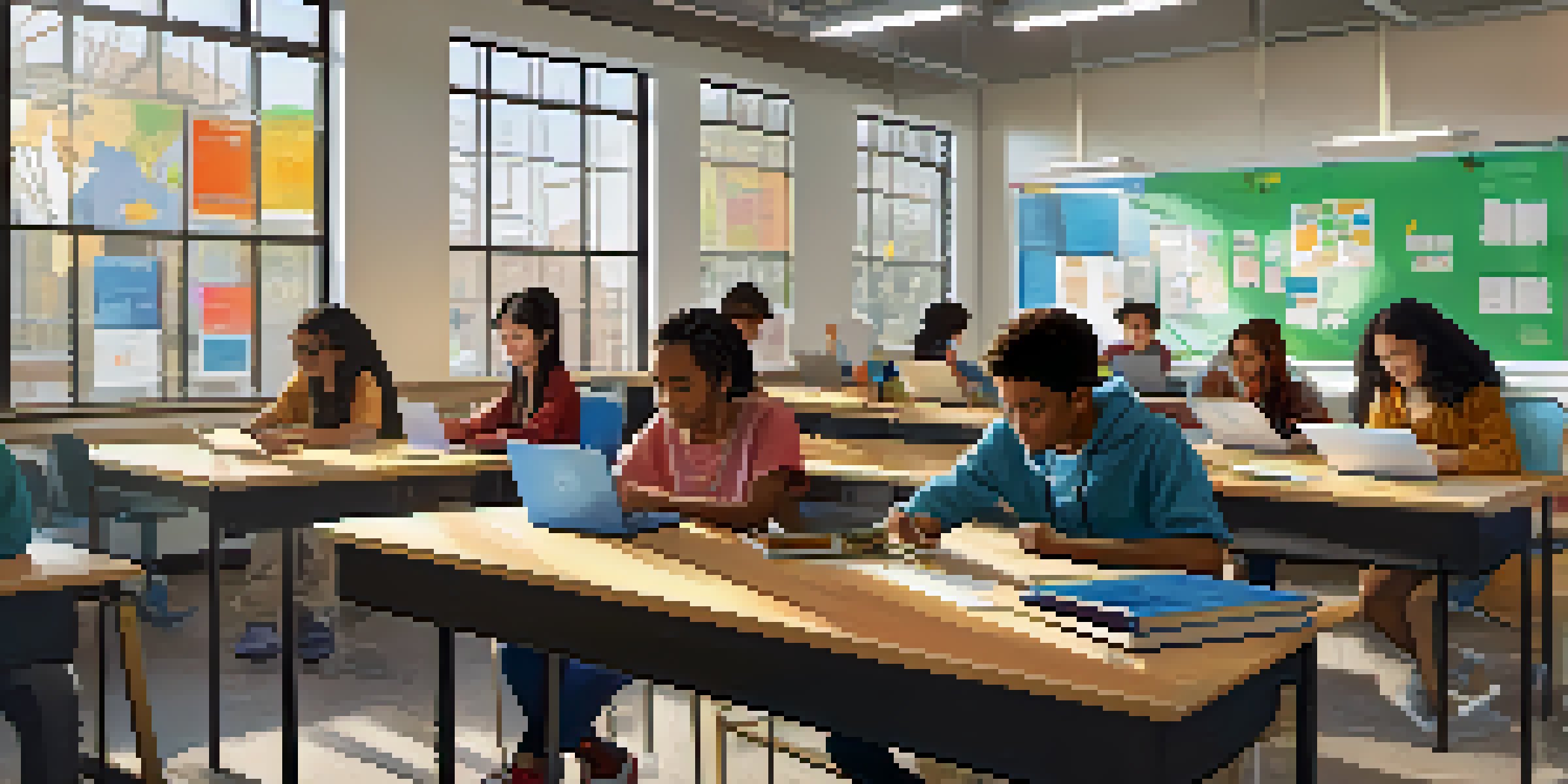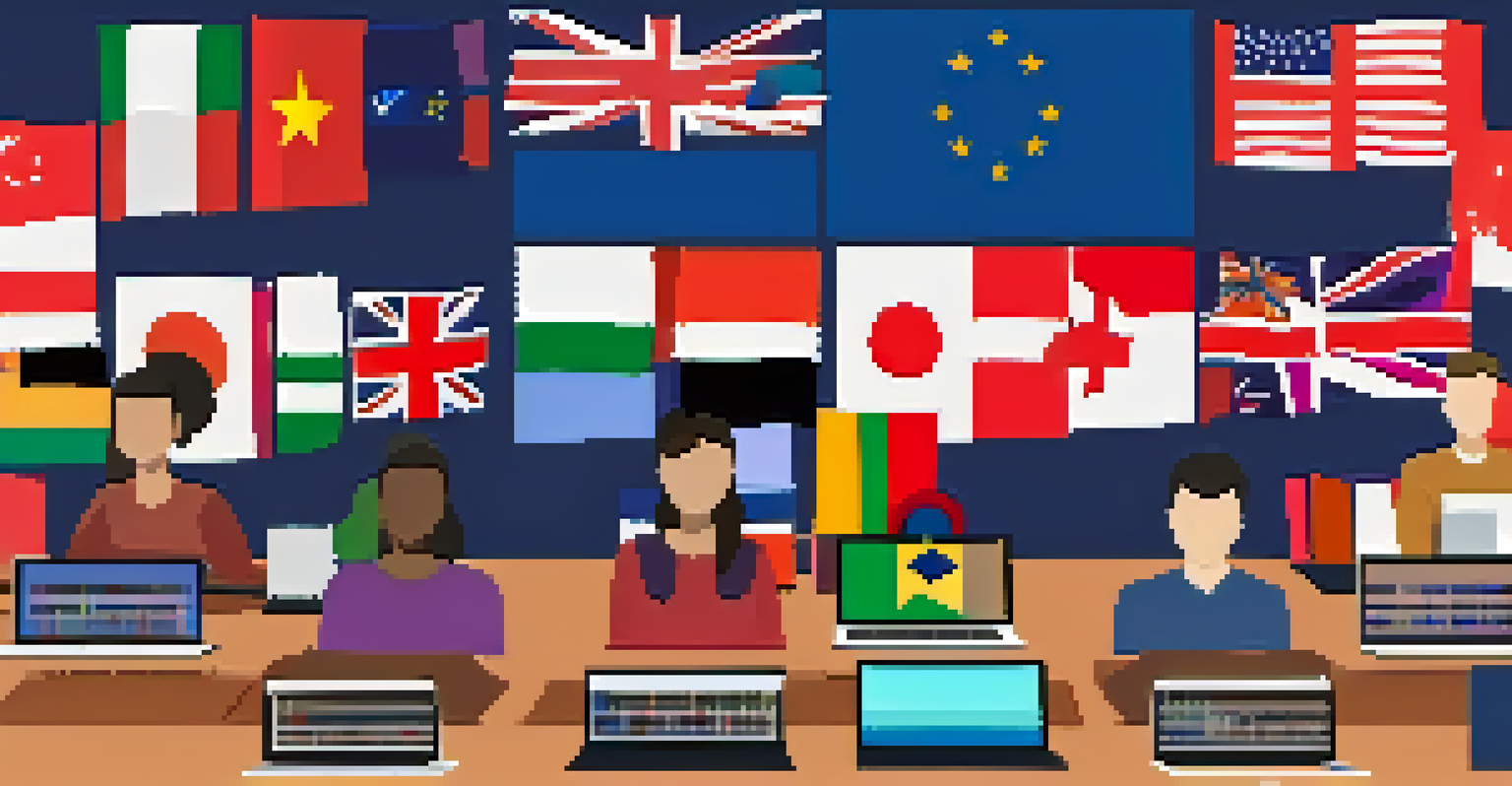The Future of Work and its Impact on Educational Practices

Understanding the Shift in Workforce Dynamics
The future of work is characterized by rapid changes in technology and employee expectations. As automation and artificial intelligence become more prevalent, the nature of jobs is evolving, requiring new skills and adaptability. This shift means that educational institutions must prepare students for roles that may not even exist yet.
Education is the most powerful weapon which you can use to change the world.
For example, roles like data scientists and AI ethicists have emerged in recent years, showcasing the demand for skills in tech and ethics. This illustrates the need for educational systems to be dynamic and responsive to labor market trends. By understanding these shifts, educators can better align their curricula with the needs of the future workforce.
Moreover, the rise of remote work has broadened the geographical boundaries for many jobs, allowing for a more diverse workplace. This aspect emphasizes the importance of teaching skills like digital communication and collaboration in educational settings.
Emphasizing Lifelong Learning in Education
With the rapid pace of technological advancements, the concept of lifelong learning has gained significant traction. Individuals now need to continuously update their skills to stay relevant in their careers. This shift necessitates a change in educational practices to foster a culture of ongoing learning beyond traditional schooling.

Educational institutions are beginning to offer more flexible learning options, such as online courses and micro-credentials, which allow individuals to learn at their own pace. This adaptability not only caters to the needs of working adults but also encourages a growth mindset among students. By embracing lifelong learning, education becomes a more personalized and engaging journey.
Embrace Lifelong Learning
Continuous skill updates are essential for career relevance in a rapidly changing job market.
Additionally, the idea of learning from failures and adapting to changes is becoming crucial. This mindset helps students and professionals alike to navigate the complexities of modern work environments, ultimately leading to more resilient and innovative thinkers.
Integrating Technology into Educational Practices
Technology is reshaping the way we teach and learn, making it essential for educational institutions to integrate it effectively. Tools like virtual reality, artificial intelligence, and online platforms can enhance the learning experience by providing interactive and personalized education. This integration not only engages students but also prepares them for tech-driven workplaces.
The only thing that prepares you for the future is learning. Lifelong learning is key to a successful career.
For instance, using AI-driven analytics can help educators identify student strengths and weaknesses, allowing for tailored instruction. Additionally, virtual classrooms have opened new avenues for collaboration and learning, connecting students from different backgrounds and cultures. This exposure to diverse perspectives is invaluable in preparing students for a global workforce.
However, it's essential to balance technology use with traditional teaching methods to ensure a well-rounded education. By combining the best of both worlds, educators can create a rich learning environment that fosters creativity and critical thinking.
Fostering Soft Skills for Future Success
In addition to technical skills, soft skills are increasingly recognized as vital for success in the modern workplace. Skills such as communication, teamwork, and emotional intelligence are essential for collaboration in diverse teams. As such, educational practices must prioritize the development of these skills alongside academic knowledge.
Group projects, presentations, and peer feedback are effective methods to cultivate soft skills in students. These activities not only enhance students' ability to work well with others but also build their confidence in expressing ideas and receiving constructive criticism. This holistic approach prepares students to thrive in collaborative work environments.
Integrate Technology in Education
Effective use of technology enhances learning experiences and prepares students for tech-driven workplaces.
Moreover, fostering emotional intelligence can lead to better workplace relationships and a more positive organizational culture. By teaching students to understand and manage their emotions, educators equip them with tools to navigate interpersonal dynamics in the workplace.
The Role of Collaboration between Education and Industry
Collaboration between educational institutions and industries is crucial in shaping relevant curricula and training programs. By working together, educators can gain insights into the specific skills and knowledge that employers seek. This partnership helps bridge the gap between education and employment, ensuring students are well-equipped for the workforce.
For example, internships and apprenticeships provide students with hands-on experience, allowing them to apply their learning in real-world scenarios. These opportunities not only enhance students' resumes but also help them build valuable professional networks. When education closely aligns with industry needs, students are more likely to secure meaningful employment after graduation.
Furthermore, guest lectures and industry partnerships can bring current trends and practices into the classroom. By exposing students to real-world challenges, educators can foster a deeper understanding of their fields and inspire innovative thinking.
Personalized Learning Experiences for Diverse Needs
The future of work demands a workforce that can adapt to various challenges, making personalized learning experiences essential. Every student has unique strengths, weaknesses, and learning styles, so a one-size-fits-all approach is no longer effective. Educational practices should incorporate personalized pathways that cater to individual needs and preferences.
For instance, adaptive learning technologies can tailor educational content to each student's pace and understanding. This not only helps students grasp complex concepts more effectively but also fosters a sense of ownership over their learning journey. Personalized learning encourages students to explore their interests, leading to greater engagement and motivation.
Foster Soft Skills for Success
Developing communication, teamwork, and emotional intelligence is crucial for thriving in diverse work environments.
Moreover, this approach can help identify and support students facing learning difficulties, ensuring that no one is left behind. By creating inclusive educational environments, we prepare all students for the diverse challenges of the future workplace.
Preparing Students for a Global Workforce
As the world becomes increasingly interconnected, preparing students for a global workforce is critical. Cultural awareness and adaptability are essential skills for success in diverse environments. Educational institutions must therefore incorporate global perspectives into their curricula to prepare students for international collaboration.
For example, language programs and cultural exchange initiatives can help students develop communication skills and cultural sensitivity. These experiences not only enhance their understanding of different perspectives but also prepare them for working in multinational teams. In a globalized economy, such skills are invaluable.

Additionally, online platforms facilitate collaboration with peers from around the world, allowing students to engage with diverse viewpoints. By fostering a global mindset, educational practices can empower students to thrive in an ever-evolving job market.